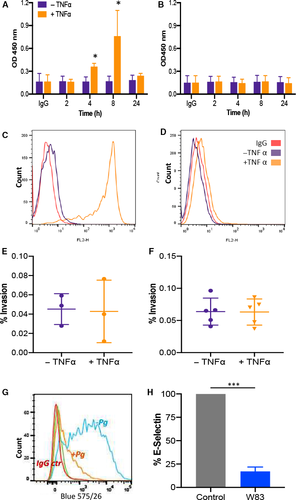Fig. 5 Pg W83 infection decreases E‐selectin abundance on HDMEC in vitro. Cell surface abundance of E‐selectin increased in a time‐dependent manner on HDMEC (A) upon treatment with TNFα (10 ng·mL−1) when analysed by cell‐based ELISA. Expression increased at 4 h, displayed maximal expression after 8 h (P < 0.05, Mann–Whitney U‐test, n = 3) with levels returning to baseline by 24 h. HMEC‐1 cells did not express E‐selectin at any time point examined (B). These data were confirmed by flow cytometric analysis where E‐selectin abundance was increased on HDMEC after 8 h TNFα stimulation (C) but was not present on HMEC‐1 with levels being similar to unstimulated controls (D). Whisker plots showing that stimulation of HDMEC (E) or HMEC‐1 (F) with 10 ng·mL−1 TNFα for 8 h did not result in increased invasion of Pg W83 compared with unstimulated control cells (enclosed squares and circles denote number of experiments performed, and data are mean ± SD). Representative flow cytometry histogram of cell surface expression of E‐selectin (G) on 8 h TNFα‐stimulated HDMEC following infection with Pg W83 (orange), IgG control (red) and uninfected control (blue). E‐selectin normalised median fluorescence intensity (nMFI) histograms of Pg W83‐infected and Pg W83‐uninfected controls. Statistical differences in E, F and H were analysed by Mann–Whitney U‐test of n = 3 independent experiments, ***P < 0.001.
Image
Figure Caption
Acknowledgments
This image is the copyrighted work of the attributed author or publisher, and
ZFIN has permission only to display this image to its users.
Additional permissions should be obtained from the applicable author or publisher of the image.
Full text @ FEBS J.

